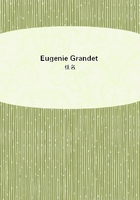
第17章
"Yes, father."
"Well then, my nephew, if you are tired, Nanon shall show you your room. It isn't a dandy's room; but you will excuse a poor wine-grower who never has a penny to spare. Taxes swallow up everything.""We do not wish to intrude, Grandet," said the banker; "you may want to talk to your nephew, and therefore we will bid you good-night."At these words the assembly rose, and each made a parting bow in keeping with his or her own character. The old notary went to the door to fetch his lantern and came back to light it, offering to accompany the des Grassins on their way. Madame des Grassins had not foreseen the incident which brought the evening prematurely to an end, her servant therefore had not arrived.
"Will you do me the honor to take my arm, madame?" said the abbe.
"Thank you, monsieur l'abbe, but I have my son," she answered dryly.
"Ladies cannot compromise themselves with me," said the abbe.
"Take Monsieur Cruchot's arm," said her husband.
The abbe walked off with the pretty lady so quickly that they were soon some distance in advance of the caravan.
"That is a good-looking young man, madame," he said, pressing her arm.
"Good-by to the grapes, the vintage is done. It is all over with us.
We may as well say adieu to Mademoiselle Grandet. Eugenie will belong to the dandy. Unless this cousin is enamoured of some Parisian woman, your son Adolphe will find another rival in--""Not at all, monsieur l'abbe. This young man cannot fail to see that Eugenie is a little fool,--a girl without the least freshness. Did you notice her to-night? She was as yellow as a quince.""Perhaps you made the cousin notice it?"
"I did not take the trouble--"
"Place yourself always beside Eugenie, madame, and you need never take the trouble to say anything to the young man against his cousin; he will make his own comparisons, which--""Well, he has promised to dine with me the day after to-morrow.""Ah! if you only /would/, madame--" said the abbe.
"What is it that you wish me to do, monsieur l'abbe? Do you mean to offer me bad advice? I have not reached the age of thirty-nine, without a stain upon my reputation, thank God! to compromise myself now, even for the empire of the Great Mogul. You and I are of an age when we both know the meaning of words. For an ecclesiastic, you certainly have ideas that are very incongruous. Fie! it is worthy of Faublas!""You have read Faublas?"
"No, monsieur l'abbe; I meant to say the /Liaisons dangereuses/.""Ah! that book is infinitely more moral," said the abbe, laughing.
"But you make me out as wicked as a young man of the present day; Ionly meant--"
"Do you dare to tell me you were not thinking of putting wicked things into my head? Isn't it perfectly clear? If this young man--who I admit is very good-looking--were to make love to me, he would not think of his cousin. In Paris, I know, good mothers do devote themselves in this way to the happiness and welfare of their children; but we live in the provinces, monsieur l'abbe.""Yes, madame."
"And," she continued, "I do not want, and Adolphe himself would not want, a hundred millions brought at such a price.""Madame, I said nothing about a hundred millions; that temptation might be too great for either of us to withstand. Only, I do think that an honest woman may permit herself, in all honor, certain harmless little coquetries, which are, in fact, part of her social duty and which--""Do you think so?"
"Are we not bound, madame, to make ourselves agreeable to each other?
--Permit me to blow my nose.--I assure you, madame," he resumed, "that the young gentleman ogled you through his glass in a more flattering manner than he put on when he looked at me; but I forgive him for doing homage to beauty in preference to old age--""It is quite apparent," said the president in his loud voice, "that Monsieur Grandet of Paris has sent his son to Saumur with extremely matrimonial intentions.""But in that case the cousin wouldn't have fallen among us like a cannon-ball," answered the notary.
"That doesn't prove anything," said Monsieur des Grassins; "the old miser is always making mysteries.""Des Grassins, my friend, I have invited the young man to dinner. You must go and ask Monsieur and Madame de Larsonniere and the du Hautoys, with the beautiful demoiselle du Hautoy, of course. I hope she will be properly dressed; that jealous mother of hers does make such a fright of her! Gentlemen, I trust that you will all do us the honor to come,"she added, stopping the procession to address the two Cruchots.
"Here you are at home, madame," said the notary.
After bowing to the three des Grassins, the three Cruchots returned home, applying their provincial genius for analysis to studying, under all its aspects, the great event of the evening, which undoubtedly changed the respective positions of Grassinists and Cruchotines. The admirable common-sense which guided all the actions of these great machinators made each side feel the necessity of a momentary alliance against a common enemy. Must they not mutually hinder Eugenie from loving her cousin, and the cousin from thinking of Eugenie? Could the Parisian resist the influence of treacherous insinuations, soft-spoken calumnies, slanders full of faint praise and artless denials, which should be made to circle incessantly about him and deceive him?